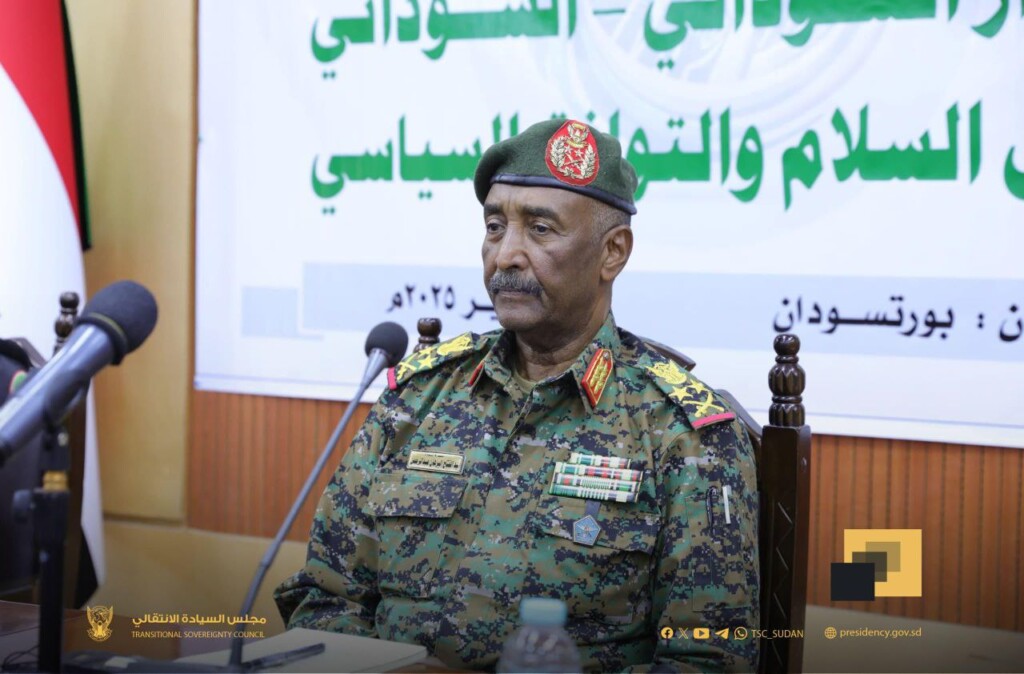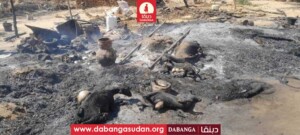North Darfur capital falls to RSF as UN warns of ‘atrocities and mass displacement’

Lt Gen Abdelfattah El Burhan, Chairman of the Transitional Sovereignty Council and Commander-in-Chief of the Sudanese Armed Forces, speaks at the close of national dialogue consultations in Port Sudan, February 2025 (File photo: Sudan Transitional Sovereignty Council)
Head of the Sovereignty Council and Commander-in-Chief of the SAF, Lt Gen Abdelfattah El Burhan confirmed the fall of El Fasher, the capital of North Darfur, to the paramilitary Rapid Support Forces (RSF), amid reports of mass killings, displacement, and widespread abuses.
In a televised address on Monday, El Burhan admitted that SAF units had withdrawn from El Fasher “to a safe location” after the RSF overran the Sixth Infantry Division’s base, one of the army’s main strongholds in western Sudan.
“Everyone is following what happened in El Fasher,” El Burhan said. “The leadership there decided to withdraw due to the systematic destruction and killing of civilians.” He vowed to avenge “our martyrs and our people in El Fasher,” accusing the RSF of crimes committed “in full view of the world.”
RSF claims control
The RSF declared full control of the city, saying its fighters were conducting “combing operations” to clear remaining resistance. The group said it had deployed units to secure public facilities and pledged to open safe corridors for civilians wishing to leave.
RSF Deputy Commander and brother of the group’s leader Mohamed ‘Hemedti’ Dagalo, Abdelrahim Dagalo, urged his forces not to harm civilians or damage property but warned that any “Shafshaf”, a term used for local resistance groups, approaching the city would be met with weapons.
Internet and satellite communications remain cut, leaving thousands trapped with little access to food, medicine, or safe water.
Mass displacement
The International Organization for Migration (IOM) reported that more than 26,000 people fled El Fasher on Sunday and Monday, following the RSF takeover. Local resistance committees said fighting continues in the city’s west, where residents have endured days without food or medical care.
The North Darfur Emergency Rooms Council described the situation as “genocide”, citing the loss of contact with dozens of volunteers and aid workers.
‘UN reports atrocities’
The UN Human Rights Office said it had received multiple credible reports of atrocities by RSF fighters, including summary executions, arbitrary detentions, and ethnically motivated killings, in both El Fasher and Bara, North Kordofan.
“The risk of further large-scale, ethnically motivated violations and atrocities in El Fasher is mounting by the day,” UN High Commissioner for Human Rights Volker Türk said in Geneva in a statement yesterday, calling for urgent action to protect civilians and ensure safe passage for those fleeing.
The UN cited disturbing videos showing unarmed men executed or lying dead, surrounded by RSF fighters accusing them of belonging to the army.
UN Humanitarian Coordinator Dennis Brown urged the RSF to allow immediate humanitarian access and open safe routes for civilians. “Civilians are trying to flee, but the roads they are taking are not safe,” he said.
US presidential adviser on Arab and African affairs, Massad Boulos, also called for a three-month humanitarian truce, warning that the fall of El Fasher could trigger Sudan’s fragmentation. “The world is watching with great concern,” he said, urging both sides to halt hostilities.
‘Reports of executions and war crimes’
The Emergency Lawyers Group accused the RSF of committing mass killings of civilians and prisoners of war.
Videos verified by the group appear to show fighters executing detainees and civilians in cold blood. It said these actions constitute war crimes and crimes against humanity, urging international investigations.
Among the dead are several well-known figures, including Ahmed Hussein Mustafa, spokesperson for the joint force, and Dr Fadil Suleiman, a university professor and Imam.
The Sudanese Journalists Syndicate said the RSF detained journalist Muammar Ibrahim while he was fleeing the city and demanded his immediate release.
‘Worst humanitarian disaster in the world’
The Darfur Regional Health Ministry described the situation in El Fasher as “the worst humanitarian disaster in the world”, citing massacres, ethnic cleansing, and total siege conditions.
It called on the United Nations and human rights organisations to intervene immediately to protect civilians.
Thousands of families continue to flee on foot amid fears of famine and epidemics as food supplies run out. Humanitarian groups warn that what is unfolding in El Fasher could mirror the atrocities seen in El Geneina and Zamzam Camp earlier this year.











 and then
and then